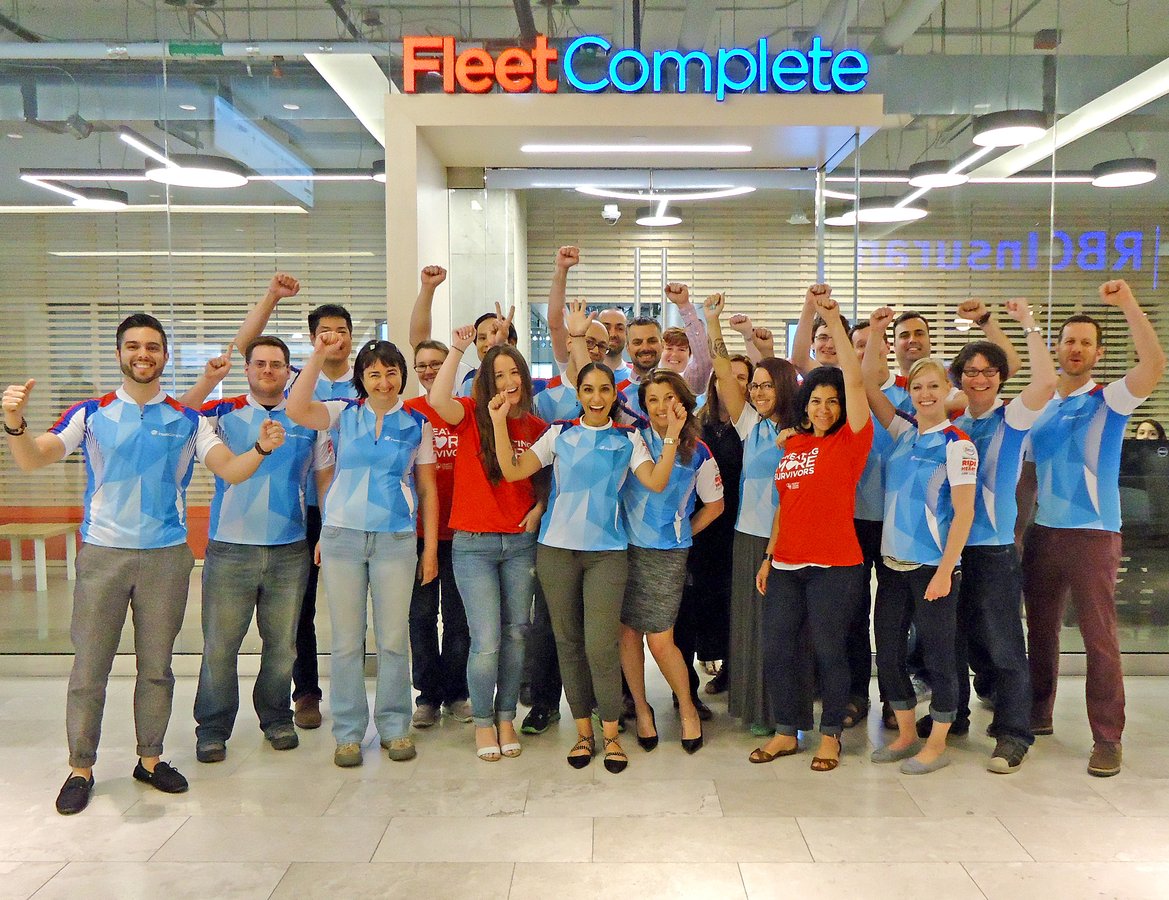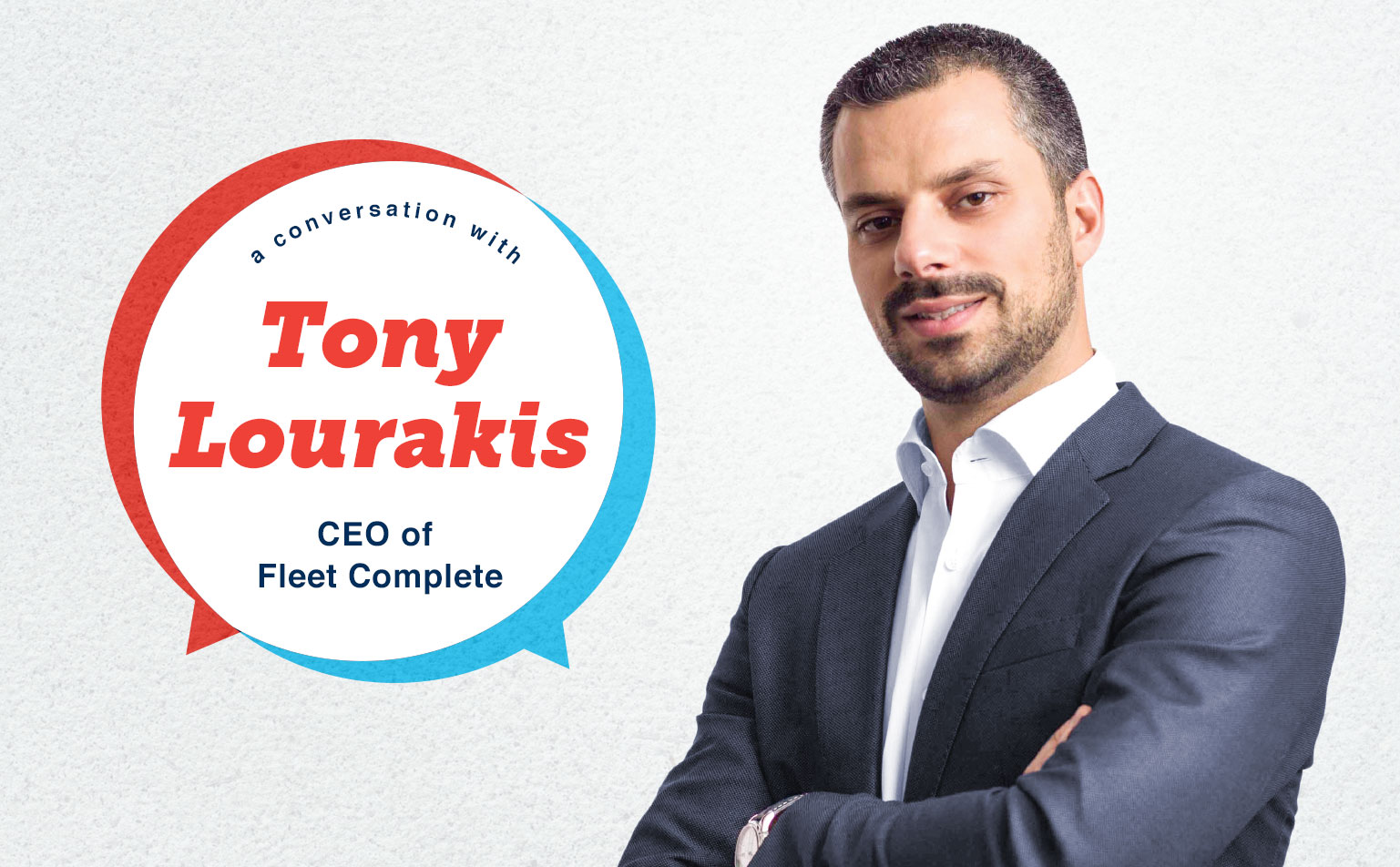Student Life Network recently sat down with another successful business executive as part of SLN’s Executive Leadership Interview Series. Read on to learn what Tony Lourakis had to say to us about achieving success.
There was a moment in time, in the early days when Tony Lourakis began building Fleet Complete, when he hit personal rock bottom. Obsessed with his work, Lourakis let himself and his relationships veer off the rails. At first, he gained weight. Then his blood pressure was higher than the healthy range for a 21 year old.. And then he inadvertently alienated some of his close friends and his family. He described that period as gruelling, stressful, gut-wrenching, nauseating, and exhausting. A combination of feelings that could convince even the most passionate of entrepreneurs to give up. But in the darkness, there was a faint light—a North Star—a personal and professional vision that Tony aspired to realize. And so he did what every wildly successful entrepreneur does during a time of crisis: re-align with the mission, and get to work—one step a time—whether in the gym or in the boardroom. Today, Tony is recognized as one of Canada’s Top 40 Under 40 Entrepreneurs. He’s also, among other things, an amateur cyclist. His story is one of perseverance; of dreaming, believing, and achieving. The art of the possible.
Part 1: High School

How was fourth year high school Tony feeling about his future?
Luckily and thankfully, my last year of high school was the time when I got inspired to get it together. I think my Grade 11 year was a bit lost. It was a darker year, I was a bit lost, I wasn’t sure where I wanted to go with life, and I just came off Grade 9 and 10 where I thought I would be an athlete. That evaporated at the end of Grade 10, beginning of Grade 11, so Grade 11 was kind of this lost year where I wasn’t sure. Then Grade 12 was when I discovered the inspiration of entrepreneurship. I got inspired to pursue this path and specifically focus on tech.
I got inspired by a family friend. There was a mentor, in essence, that was probably in his late 20s at that time. I was like, 17 and he had a small tech consulting business: software development, custom development, stuff like that. He was doing well with it, making tons of money, living large, had lots of great toys, motorcycles, and fast cars.
Nice.
You know, the things that for a 17-year-old seem cool, right? I grew up in a low-to-middle class, blue collar, hard working, immigrant parents kind of upbringing. So to me, those were kind of out of reach, luxuries that inspired me and thought this person didn’t have that much different of an upbringing than me. He reached this level and I thought, “How does someone like me reach this level?” He did it through being an entrepreneur in technology. I started to kind of dig into that world and found further inspiration from the giants like Bill Gates and Steve Jobs and Jeff Bezos and Larry Ellison and I studied them. I studied them big time, and I decided to take an education path into computer science and create a tech company.
So, in addition to these luminaries that you mentioned and having this family friend who made a very accessible path into that world, you saw Seneca College in 1997 as a program and the school that you wanted to attend. What was it about Seneca that drew you in?
To be honest, I felt like a technical college program was a quick and efficient path to just learn the tools of the trade, per se. I didn’t care about the resume, it wasn’t about going to some fancy school or university that might help you get a job at a Microsoft or a Google or something like that. Really, I wanted to start my business. So I’m like, “What’s the quickest way I can learn what I need to learn to start writing code and developing software products?” To me, Seneca provided that very technical, practical, computer science education that was fast.
Part 2: Post-Secondary

I want to know more about Tony at Seneca College. From what I’ve read you were an enterprising student. I think it was there that you started the systems support house and IT solutions provider, your first company, Canlogic. I’m curious to know how you balanced your studies with your entrepreneurial aspirations
Well, it was not balanced, because I was always working. Working meaning working on either school or my business every waking moment. There was nothing else.
There was nothing else. You were obsessed, yeah?
Yeah, it was probably ’98 to 2000 when I created what is now Fleet Complete. I worked every single waking moment of my life for those two years…I didn’t do anything else. When I think about it, I was a pretty crappy friend because I was not going out anymore like I used to. And I was not a great son to my parents, I was not a great brother to my sister or boyfriend to my girlfriend because I was doing this. I mean, it was not sustainable, my health kind of went south. I went from being an athlete, being ripped, having a six-pack, to being a chubby college kid. My blood pressure was high. My health was kind of failing. I sacrificed everything.
Did you sacrifice your grades as well?
No, I was a great student, because that was part of it. I was all-in, not on just the business. On learning at school and the business. So I was all-in for computer science and my business. So I did great at school, at college.
The two areas of your life, your grades, as well as your business, were your high points. However, before we pick it back up and go into those high points, what were some of your lowest points as a student?
I wouldn’t say there were low points so much as a student, because it was the early years of starting the business. It was just gruelling. It was stressful, it was gut-wrenching at times, it was nauseating, it was exhausting, it was a roller coaster.
I can imagine. What was your highest point as a student at Seneca College? What was the point that made you feel the most self-actualized and happy and enough?
Well, those years from Grade 12 through graduating college were also very thrilling because it was the first time in my whole life that I was studying something that I became super passionate about. I grew, I fell in love with it, I was studying something that was purposeful. I was, academically, not a great student before that because I didn’t feel super attached to the school.
Right.
School was necessary, not inspiring. However, being at Seneca, studying something that I wanted to develop life around and business around, I was all in. I was soaking it up. So when you learned stuff, it was so much fun. I remember loving my C, C++ courses, loving my database administration and architecture courses. Because I’m in these classes and I’m envisioning the application of what I’m learning, in a business sense. That is so, so much fun.
In hindsight, if you could go back in time and tap a young Tony on the shoulder and give him one piece of advice, what would it be?
I don’t think I would say anything.
You’d just let him go through it and experience it so that he comes out on the other side?
Yeah, the problem with that question or that thinking is there are many things, there are many things that you could say of, “Hey, this was not a good experience. Do this, do something else instead.” However, the thing is, I had to go through all that. I had to learn all those things that I learned. And I had to have those challenges; I had to have that suffering that I went through.
Absolutely.
I believe because it’s how I got here. It’s what lined my path to get to this place. A lot of it was painful. I was suffering along the way, however, it was part of the learning experience. So I don’t know if I would take any of that away.
Part 3: Dream Job

Right, because the story might have ended up differently had you had the premonition that these things were going to happen. That lead to things like starting Fleet Complete, winning accolades, being named on Canada’s Top 40 Under 40. What is the secret to your success?
I don’t think there is any secret. It’s many things including loving what you do, working incredibly hard, building a fantastic team, really investing in surrounding yourself with the best and brightest people you can find that will love what they do with you and love doing it together with you. That’s the obvious stuff, frankly. Investing much energy in creating your plan. What’s your strategy, what’s your plan, why are you doing this? Why will people choose to work with you and buy from you? And what can you offer that’s special and unique? Focusing on that and sticking to that plan.
What’s the best part of your current role at Fleet Complete? What gets you up out of bed every morning?
It’s kind of like the art of the possible. We’re in this incredible place in our business, in our growth, where there are so many possibilities. It’s endless, and I think we’re over 100 million revenue business now and it’s not just about revenues and size, but what we’re doing is so much fun. Doing it together with the team that we’ve built around the world is so much fun. Solving these problems that we come across is fun. It’s just having so much fun changing the world in our way, helping fleet-based businesses thrive and succeed and operate.
You have your philanthropic endeavours like the YMCA, the Hellenic Heritage Foundation, and you maintain an active personal life. You’ve got your family, cycling. You were in Spain recently. How do your philanthropic endeavours and your own life support your professional success?
Support my professional success? That’s not what I’m trying to do, necessarily. My philanthropic endeavours are not really to support my professional success. It’s the other way around. I think my professional success helped me promote my charitable endeavours.
Right on.
However, an outcome of those efforts is that I’ve learned so much. I’ve sat on a couple of Boards, and now I’m Chairing the Hellenic Heritage Foundation right now and being on that Board as an example I have some incredible Board members that I’m learning from. That does have a positive side effect that helps in business, just those learnings.
How do you continue learning? What are some books, podcasts, resources, conferences that you’d recommend to our student audience?
I love learning from leaders that I admire or aspire to operate more like. So I follow Satya Nadella from Microsoft. I have his book (I think it’s called Hit Refresh). And I love social media today—you can do micro-reading as these guys have blogs and posts and keynotes speeches that you can watch online. People like, even Elon Musk, he’s such an incredible innovator, like Sergey and Larry from Google, even Mark Zuckerberg. I love following all the tech leaders. I still follow Bill Gates a lot—I love his philanthropic work and his vision is incredible.
Part 4: The Future

You’ve been described as a visionary and you’ve got your eyes firmly fixed on the future. I think Fleet Complete is a testament to that. You’ve anticipated the Internet of Things years before it became a fixture in the current economy. What are some other industry trends that you’re looking out for at the moment?
I’m focused right now on everything happening in the vehicle ecosystem. So you have electrification, vehicles are moving from gas and diesel to electric. You have an autonomous vehicle, AV happening. That’s an incredible innovation that’s going to disrupt a lot over time. And then what we call connected vehicle, connected cars, so more and more vehicles are being connected right from their creation from manufacturing, and they’re becoming like devices. They’re smart and connected like your smartphone, and they can run apps, they can download stuff, they can do things over the air, they can get more intelligent, better and even the sub-systems of vehicles like engines and transmissions and tires and brake systems will be independently connected and smart. We’re spending much time thinking about that and working on that.
What advice would you give a student who is interested in working at Fleet Complete? What kind of skills can they bring to the table? How can they get your attention and become an outstanding contributor at Fleet Complete?
The advice I give any student: immerse yourself. You’re going to go well beyond the classroom and the textbooks. If you want to be in a specific industry, in a vertical, in a field, immerse yourself. Learn everything you can learn about that topic. Find out who are the best in the world at that practice or field today. Study them, learn how they got to that level of being the best and emulate, follow those practices. Whatever it is, just go hard and deep into it.
That’s some great validation for the entrepreneurial students out there. Flipping this a bit, what’s the best piece of advice you’ve ever received?
People.
People?
You know, the point of being dedicated to surrounding yourself with the best and brightest and culturally-aligned people is what will drive the success. Because at the end of the day, Fleet Complete is not me by myself. It’s a collection of some super talented people. Five hundred of them now. That belief in this vision and this mission and are passionate and work hard and are smart in their area. They’re working in. And contributing a ton. That’s what drives the success.
The Executive Leadership Interview Series by Student Life Network features insights from Canada’s most accomplished business leaders. On behalf of millions of students across the country, we’re conducting exclusive informational interviews with titans of industry. Learning how these leaders made the successful transition from high school through post-secondary all the way to their dream job, we’re capturing their wisdom and knowledge, and sharing it with you.

Turn Your Downtime Into Uptime.
*Opinions expressed are those of the author, and not necessarily those of Student Life Network or their partners.




